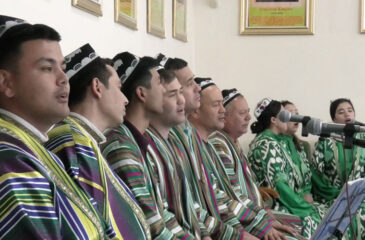Post Tagged with: "Uzbek"
-
Visit to the Farg’ona Maqom School and the Marg’ilan Maqom Theatre
With members of the Marg’ilan Maqom Theatre In April 2025, Rachel Harris and Aziz Isa Elkun were generously hosted by the Maqom School led by Ulug’bek Mamadjanov, and the Maqom Theatre led by Fazil Ismailov. Both are recently established, on the foundation of existing music institutions, but with a new focus on maqom. The Maqom School holds several hundred students of school age, and several dozen talented teachers who are […]
-
Connecting through Nava
by Mukaddas Mijit Connecting through Nava: Documenting Shared Musical Heritage with Uzbek and Uyghur Musicians in Tashkent, March 2025 In March 2025, we embarked on a one-week field trip exploring the connections between Uzbek Maqam and Uyghur Muqam practices with few outstanding musicians. Our journey led us to the Yunus Rajabi Institute of Traditional Music in Tashkent- a landmark institution for Uzbek musical heritage. For this initial phase of our project, we […]
-
Strand 1: Maqām across the Soviet-Chinese divide
Rachel Harris, Eugene Leung, Mukaddas Mijit. This strand aims at “unbordering” Central Asian maqām repertoires across the former Soviet-Chinese divide. It focuses on repertoires canonised in the twentieth century as the separate Uzbek and Tajik Shashmaqām, and the Uyghur Twelve Muqam, and also less recognised regional maqām traditions from Khorezm, Ferghana and Turpan. Since the mid-twentieth century these repertoires have been extensively nationalised, and the overwhelming thrust of scholarship, training […]
-
Project Strands
MAQĀM BEYOND NATION is designed in the form of six interlinked research strands based in different contact zones across the maqām world. Strand 1: Maqām across the Soviet-Chinese divide Rachel Harris, Giovanni De Zorzi, Mukaddas Mijit This strand aims at “unbordering” Central Asian maqām repertoires across the former Soviet-Chinese divide. It focuses on repertoires canonised in the twentieth century as the separate Uzbek and Tajik Shashmaqām, and the Uyghur Twelve […]




